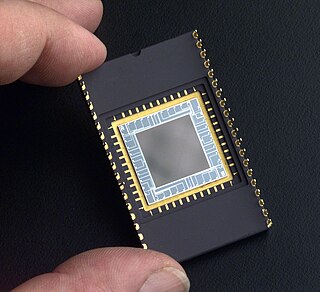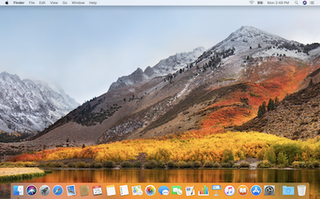
A charge-coupled device (CCD) is an integrated circuit containing an array of linked, or coupled, capacitors. Under the control of an external circuit, each capacitor can transfer its electric charge to a neighboring capacitor. CCD sensors are a major technology used in digital imaging.
Color depth or colour depth, also known as bit depth, is either the number of bits used to indicate the color of a single pixel, or the number of bits used for each color component of a single pixel. When referring to a pixel, the concept can be defined as bits per pixel (bpp). When referring to a color component, the concept can be defined as bits per component, bits per channel, bits per color, and also bits per pixel component, bits per color channel or bits per sample (bps). Modern standards tend to use bits per component, but historical lower-depth systems used bits per pixel more often.
A diode-pumped solid-state laser (DPSSL) is a solid-state laser made by pumping a solid gain medium, for example, a ruby or a neodymium-doped YAG crystal, with a laser diode.

"Hey Ya!" is a popular song performed by American hip-hop duo Outkast, specifically group member André 3000, who wrote and produced the song. Along with "The Way You Move", recorded by Outkast's other member Big Boi, "Hey Ya!" was released by Arista Records as one of the two lead singles from the duo's fifth album, Speakerboxxx/The Love Below, on August 25, 2003. The track became a commercial success, reaching number one in the United States, Australia, Canada, the Czech Republic, Norway, and Sweden. "Hey Ya!" received critical acclaim upon release, and is consistently ranked as one of the greatest songs of the 2000s.

The term quantum efficiency (QE) may apply to incident photon to converted electron (IPCE) ratio of a photosensitive device, or it may refer to the TMR effect of a Magnetic Tunnel Junction.
Hey or Hey! may refer to:

"Hey You" is a song by English rock band Pink Floyd, released on their 1979 double album The Wall. The song, along with "The Show Must Go On", was edited out of the film for fear on the part of the filmmakers that the film was running too long; however, a rough version is available as an extra on the 25th Anniversary Edition DVD.

"Can You Celebrate?" is Namie Amuro's seventh solo single under the Avex Trax label. Released on February 19, 1997, "Can You Celebrate" is the best-selling single by a solo female artist in Japanese music history, with sales of 2,296,200 copies.

Underfloor heating and cooling is a form of central heating and cooling that achieves indoor climate control for thermal comfort using hydronic or electrical heating elements embedded in a floor. Heating is achieved by conduction, radiation and convection. Use of underfloor heating dates back to the Neoglacial and Neolithic periods.

"Hey You" is a charity song written and recorded by American singer Madonna. She co-produced the song with Pharrell Williams for the Live Earth campaign. It was released digitally on May 24, 2007 and was available on the CD and DVD of the Live Earth concerts on December 4, 2007. Musically it is a stripped-down, folksy ballad with straightforward, anthem-like lyrics talking about how to save the world from destruction. The song received generally mixed reviews, with one group of reviewers commenting that the modest message of the song was uninspiring while others called the song sweet and commended Madonna's commitment to charity.
Hey! Say! JUMP is an eight-member Japanese boy band under the Japanese talent agency Johnny & Associates. The group is split into two sub-groups: Hey! Say! BEST and Hey! Say! 7. In Japan they sold more than 10 million physical copies.
A visual search engine is a search engine designed to search for information on the World Wide Web through the input of an image or a search engine with a visual display of the search results. Information may consist of web pages, locations, other images and other types of documents. This type of search engines is mostly used to search on the mobile Internet through an image of an unknown object. Examples are buildings in a foreign city. These search engines often use techniques for Content Based Image Retrieval.

"Hey Deanie" is a song written by Eric Carmen. It was a popular hit single by Shaun Cassidy that was released the last week of November, 1977 from his album, Born Late. It was his third and final top 10 hit, peaked at number seven for two weeks on the Billboard Hot 100, spending four months on the chart from late 1977 to early 1978. As with Cassidy's prior singles, this song also became a gold record.

"Hey, Soul Sister" is a song by American rock band Train. It was written by lead singer Pat Monahan, Amund Bjørklund, and Espen Lind. It was released as the lead single from the band's fifth studio album, Save Me, San Francisco (2009).
MPEG-H is a group of international standards under development by the ISO/IEC Moving Picture Experts Group (MPEG). It has various "parts" – each of which can be considered a separate standard. These include a media transport protocol standard, a video compression standard, an audio compression standard, a digital file format container standard, three reference software packages, three conformance testing standards, and related technologies and technical reports. The group of standards is formally known as ISO/IEC 23008 – High efficiency coding and media delivery in heterogeneous environments. Development of the standards began around 2010, and the first fully approved standard in the group was published in 2013. Most of the standards in the group have been revised or amended several times to add additional extended features since their first edition.
High Efficiency Image File Format (HEIF) is a container format for storing individual digital images and image sequences. The standard covers multimedia files that can also include other media streams, such as timed text, audio and video.

macOS High Sierra is the fourteenth major release of macOS, Apple Inc.'s desktop operating system for Macintosh computers. macOS High Sierra was announced at the WWDC 2017 on June 5, 2017 and was released on September 25, 2017. The name "High Sierra" refers to the High Sierra region in California. Following on from macOS Sierra, its iterative name also alludes to its status as a refinement of its predecessor, focused on performance improvements and technical updates rather than user features. This makes it similar to previous macOS releases Snow Leopard, Mountain Lion and El Capitan. Among the apps with notable changes are Photos and Safari.
AV1 Image File Format (AVIF) is an image file format specification for storing images or image sequences compressed with AV1 in the HEIF container format. It competes with HEIC, which uses the same container format built upon ISOBMFF, but HEVC for compression. Version 1.0.0 of the AVIF specification was finalized in February 2019.

The Charlottesville car attack was a white supremacist terrorist attack perpetrated on August 12, 2017, when James Alex Fields, Jr. deliberately drove his car into a crowd of people peacefully protesting the Unite the Right rally in Charlottesville, Virginia, killing one person and injuring 35. 20-year-old Fields had previously espoused neo-Nazi and white supremacist beliefs, and drove from Ohio to attend the rally. He was convicted in a state court for the first-degree murder of 32-year-old Heather Heyer, eight counts of malicious wounding, and hit and run, and was sentenced to life in prison plus an additional 419 years in July 2019. He also pled guilty to 29 of 30 federal hate crime charges to avoid the death penalty, which resulted in another life sentence handed down in June 2019.

Apple M1 is a series of ARM-based systems-on-a-chip (SoCs) designed by Apple Inc. as a central processing unit (CPU) and graphics processing unit (GPU) for its Macintosh desktops and notebooks, and the iPad Pro and iPad Air tablets. The M1 chip initiated Apple's third change to the instruction set architecture used by Macintosh computers, switching from Intel to Apple silicon 14 years after they were switched from PowerPC to Intel, and 26 years after the transition from the original Motorola 68000 series to PowerPC. At the time of introduction in 2020, Apple said that the M1 had the world's fastest CPU core "in low power silicon" and the world's best CPU performance per watt. Its successor, Apple M2, was announced on June 6, 2022 at WWDC.











